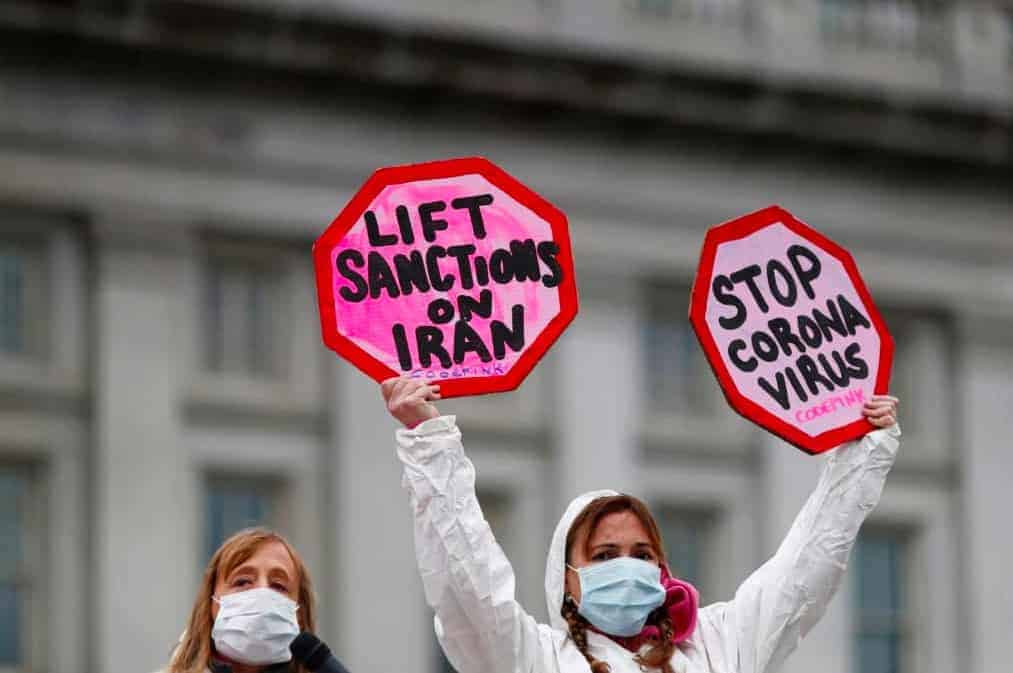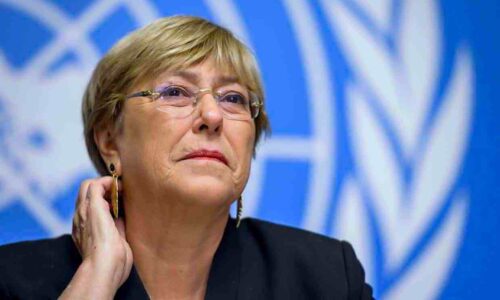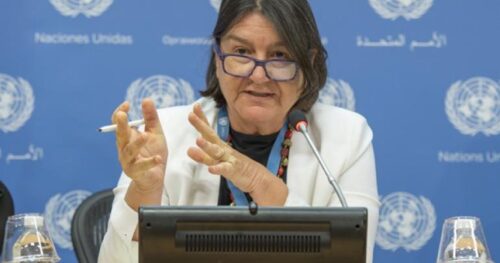At a time of a global health and economic crisis, some UN officials, such as the Special Rapporteur on the Right to Food, are calling for lifting sanctions around the world.
By Stéphanie Fillion and Kacie Candela
Pass Blue

During the last week of March, Hilal Elver, the United Nations special rapporteur on the right to food, was one of three high-level UN representatives to call for an easing of some sanctions to help alleviate the impact of the coronavirus.
UN Secretary-General António Guterres sent a letter to G-20 countries asking them to waive sanctions that can undermine a country’s ability to respond to the pandemic. And Michelle Bachelet, the UN high commissioner for human rights, said that “humanitarian exemptions to sanctions measures should be given broad and practical effect, with prompt, flexible authorization for essential medical equipment and supplies.”
Elver, like Bachelet, has been asking for a softening of some sanctions for a while but still wasn’t expecting these two influential UN figures to make such a call. “I was never expecting [them] to talk about economic sanctions,” Elver said in an interview recently. “It came as kind of a surprise.” The pandemic has shaken many things up, and she’s hoping the leaders’ renewed interest will last.
Sanctions returned to the spotlight after numerous experts and politicians recommended an easing up — while leaders in many countries, including Joe Biden, the U.S. Democratic presidential front-runner, and Senator Dianne Feinstein (D-CA), also supported the possibility. Elver, whose second three-year term as a special rapporteur ends this month, has witnessed the impact of sanctions on ordinary people who need food and has expressed hope that the pandemic will offer a chance to revisit their use.
“There definitely will be some international political agenda about economic sanctions,” she said.
Elver, who has both a law degree and a Ph.D., is a fellow in food law and policy at the University of California, Los Angeles. She was born and raised in Turkey and recently spoke with PassBlue from her second home, in Bodrum, in southern Turkey, where she is in a government-imposed stay-at-home order. “We started our summer holiday a little early,” she said.
Her remarks have been edited for clarity and length. The full interview is available on the podcast series “UN-Scripted,” which includes a discussion of sanctions with Loraine Rickard-Martin, an author of “The Evolution of UN Sanctions: From a Tool of Warfare to a Tool of Peace, Security and Human Rights.”
(To hear the episode, download from SoundCloud, Apple Podcasts, Patreon, Spotify, Stitcher or TuneIn.)
Q. Why was it important, at the end of your term right now, to make a call for lifting economic sanctions? I have been making these calls before the high commissioner for human rights did, since visiting Zimbabwe a few months ago. I found out there that economic sanctions have a serious impact on ordinary people and a basic human right to food and food security, as I made clear in my initial report. I also had some communication with the government of Cuba. In a letter, I asked the United States government to ease sanctions against Cuba because six months ago there was a hurricane there and they were in trouble. I am very familiar with the negative impacts of economic sanctions on human rights and on the right to food. These are not UN Security Council [sanctions] but unilateral economic sanctions against many countries by the U.S., and sometimes the European Union.
Q. Your focus is on food as a UN expert. You’ve witnessed the effect of sanctions on food accessibility firsthand. Can you describe what it’s like right now, not only in Cuba and Zimbabwe, but also in other countries like Iran and Venezuela? Every country has a different kind of level of sanctions, depending on the U.S. or European Union’s rules and principles, and they can involve political reasons or human-rights violations. For instance, Zimbabwe has had sanctions for almost 20 years because of human-rights violations. [Among other things] white farmers have lost their land, so the UK and U.S. imposed sanctions [for the land redistribution campaign begun in the 1980s, during the presidency of Robert Mugabe; the U.S. extended them this year]. That was directly connected to the right to food and food security because farmers were not able to produce what they used to, so that was a direct impact.
North Korea and Venezuela have blanket sanctions, which are much larger than the ones imposed on Zimbabwe. Sometimes sanctions are only against some people, or some corporations, but even limited sanctions have a very important impact on the country’s imports and exports and any kind of economic relationship with the rest of the world. These countries are basically isolated, so it’s very difficult to buy and sell. They buy more expensive products because third countries also suspend relationships with them. For instance, in the case of Cuba or Venezuela, if country “B” does business with one of them, then the United States won’t do any business with “B.” So that’s a very important problem in terms of the economic conditions of the country.
Q. Can you tell me how the sanctions issue fits into the pandemic context? You can easily understand right now that because of the coronavirus there is a significant isolation for literally every country. Even those without any kind of economic sanctions can be affected by restrictions on exports and imports. Many major food exporters are thinking about limiting the export of food or medicine to keep supplies for their own people, which adds more difficulties during this pandemic, on top of the economic sanctions. Zimbabwe’s health system was completely broken before the coronavirus — think about it now.
Q. What has the response been from your call and Michelle Bachelet’s to lift sanctions during the pandemic? Even the UN secretary-general agreed. It’s very much on the political agenda. The U.S., under the current administration, is very keen to continue the sanctions. Fortunately, some other countries are not. For instance, the European Union and many of the European countries are responding positively and easing sanctions during this time of the coronavirus. They are not completely lifting sanctions but interrupting them, and there are some communications going on, but not in the U.S., unfortunately.
Q. In the long run, what are you hoping will come out of the sanctions’ call? There definitely will be some international political agenda about economic sanctions. Covid-19 has put them on the agenda. I was never expecting the UN secretary-general to make such a call, or even Michelle Bachelet. It came as a surprise.
According to international law, there are two views on sanctions. One group says economic sanctions don’t really work because the elite is never really affected, while ordinary citizens pay the bill. The other one is saying no, this is the only alternative to going to war that would make a country come to the negotiation table. If you look at places like North Korea, it has been under sanctions for years but never changed its policies. So in my view, and many others’, economic sanctions, when implemented, should be done with extreme care.
Stéphanie Fillion is a New York-based reporter specializing in foreign affairs and human rights. She has a master’s degree in journalism, politics and global affairs from Columbia University and a B.A. in political science from McGill University. Fillion was awarded a European Union in Canada Young Journalists fellowship in 2015 and was an editorial fellow for La Stampa in 2017.
Kacie Candela is an assistant editor for PassBlue and a news anchor and reporter with WFUV, a public-radio station in the Bronx, N.Y., where she covers the UN and other beats. Her work has won various awards from the New York State Associated Press Association, New York State Broadcasters Association, PRNDI and the Alliance for Women in Media. She is a recent graduate of Fordham University, where she is now a law student.
Please Donate to Consortium News.



The US should lift all its sanctions during the pandemic. Most of its economic sanctions are indeed a form of economic warfare. Washington must learn to compete openly, honestly, and democratically.
From the article: “[Sanctions are] the only alternative to going to war that would make a country come to the negotiation table.”
No. Wrong. Sanctions are not a peace initiative. They are a form of warfare that makes a country capitulate. Capitulation is humiliating. Humiliation results in resentment. Humiliation and resentment are not fertile soil for peace.
There may be two views on sanctions according to international law, but I believe the notion that “[Sanctions are] the only alternative to going to war that would make a country come to the negotiation table” is mistaken. Sanctions are not a peace initiative. They are a form of warfare designed to make a country capitulate. Capitulation is humiliating. Humiliation leads to resentment. Humiliation and resentment are not fertile soil for peace.
Sanctions, especially the unilateral illegal ones favored by the USA,are just spiteful, cruel punishment on people whose government the USA has decided it does not like or approve of. All of them should be removed.Even those approved by the UN are unlikely to have the effect wanted by the UN, and others, like those the EU imposed on Russia, are done at the urging of the USA, which does not get hurt by them but the EU does.
I whole-heartily agree with and support this calling to lift the sanctions discussed in the article.
The beauty I think is that if not all are willing to participate in this humanitarian action, then those who do can unilaterally decide it is in the interest of their county to do so. If this results in another country wanting to punish a humanitarian action, then that just makes it even more public about some country’s agenda(s) that are basically harmful from the top to the bottom (or so it seems to me).
Nobody should be dying anywhere because they don’t have enough bread or the vital medical care and medicines that we ALL need.
So simple it is bizarre that this even needs to be typed.
We need to consider ending sanctions of America’s poor as well. No one should need to point out that not everyone can work, and viable jobs are not available for all. In a more sane era, the US provided modest (usually, sub-poverty level) aid to those in need. Over 80% of recipients used it short-term, as the proverbial “ladder out of poverty,” getting a foothold in the job market. Since ending it, the overall life expectancy of the US poor fell below that of every developed nation. It’s one thing to “stand up” for those in distant countries, knowing our ability to change things is very limited. It’s another thing to turn our backs on those in need right here, knowing we actually could restore basic humanitarian relief, if there was the will to do so.
@ DH Fabian
Hear hear. We do need to consider the poor in our own communities. I think it starts with jobs……and I know this idea is “old-fashioned”. Why the US ever out-sourced so much industry is a mystery from the perspective of the workers. Everything was good until it wasn’t….it just took something that could have been predicted to make it more evident. Regardless, the time for change is now.
I think there is the will to do what you suggest. Count me among those with the will. Better yet, count me as someone with a plan where everybody who wants it can find useful employment with a living wage so that we don’t need no Gubment handouts. We just need to form a more local supply chain. It is in everyone’s interest. Small scale to a degree, but mainly local supply of the daily goods we need because why to these goods need to travel across any oceans?
Almost all of America’s sanctions are illegal.
Why? They are American laws being applied against other countries.
America is only successful because there are no others of equal financial and military strength to block it.
And there is no international court which the United States would obey. It shows contempt for most international organizations these days because it sees them as standing in its way.
Illegality means nothing to Trump. It’s illegal what he is doing in Syria. It is illegal what he’s doing in Iraq. It is illegal what he’s doing in Venezuela and Cuba.
Sanctions always, even in normal times, hurt the poor and the weak in a society, the better-off and privileged managing to insulate themselves. That is just what they do anywhere. So, they are reprehensible, but at a time of world pandemic, with Iran being hit hard, it just despicable to keep sanctions on the country.
Trump does all this for one reason only, to please some American oligarchs who, in return, will give his re-election campaign large donations and perhaps other support.
Elections in America are about money, and the country’s foreign policy is essentially for sale. Just an awful state of affairs. A totally corrupt society.
There is only one fault with all that John, Trump does not need other people’s money to get elected, he has plenty of his own. Your argument works for all the other presidents back to WW2 and beyond , but not with the Don. The US is corrupt but mainly at a certain level and above, not below.
To Norah,
Wrong, he does not use his own money, of which, in fact, he may have have much less than people generally believe. A long history of bankruptcies and tax avoidance and dark loans and none of it clearly revealed to the public.
He has literally grovelled to Sheldon Adelson (net worth, $30 billion), awarding his wife the Medal of Freedom, and some other American oligarchs who regard Israel as the top priority.
This is barbaric. Germ warfare in short. The world sees and the World will remember.